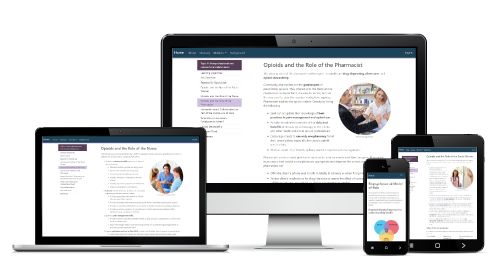What?
8 modules, 65 topics about opioids

- Module 1: Epidemiology of Opioid Use – Demonstrate an understanding of the clinical and recreational use of opioids in Canada, and the impact of their use on the health and wellbeing of people in Canada.
- Module 2: Continuum of Care and Available Resources – Recognize the importance of a continuum of care and know the available resources for people using opioids and opioid use disorder
- Module 3: Screening, Assessment, Intervention, and Structured Follow-Up – Demonstrate culturally safe/appropriate screening, assessment, intervention, structured follow-up, and support skills related to opioid use and opioid use disorder.
- Module 4: Trusting, Compassionate, Therapeutic Relationships – Establish a mutually trusting and therapeutic relationship with persons using opioids or persons with opioid use disorder, and their support networks.
- Module 5: Trauma, Violence, and Cultural Safety – Integrate trauma- and violence-informed practice and cultural safety principles in providing care or services to persons who use opioids or persons with opioid use disorder.
- Module 6: Opioid Use Education – Educate persons, families, support persons, communities, decision makers, Elders, other health care and social service professionals, and the public regarding opioid use and opioid use disorder.
- Module 7: Pain Management – Explain pain and pain management, specific to opioid use and opioid use disorders.
- Module 8: Harm Reduction – Integrate an understanding of harm reduction in providing care or services to persons using opioids and persons with opioid use disorder.
Who?
Students and faculty in social work, pharmacy, and registered nursing programs.

Why?
To address the opioid crisis with interprofessional information, resources, and tools related to opioid use and opioid use disorder.

Additional Resources
Additional resources related to opioid use and opioid use disorder.
Lived Experiences
Read and hear from persons with lived experience. Their stories represent knowledge gained from lived experience and are important sources of information that health and social service providers need to listen to and respect.
Interprofessional Guidelines
The Interprofessional Guidelines are consensus-based interprofessional learning outcomes and indicators intended to guide registered nursing, pharmacy and social work education programs in the area of opioid use and opioid use disorder.